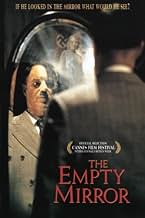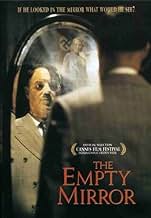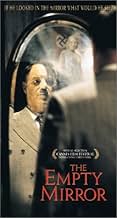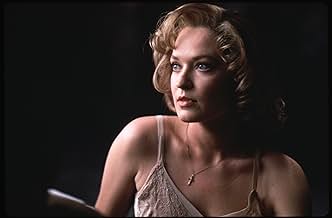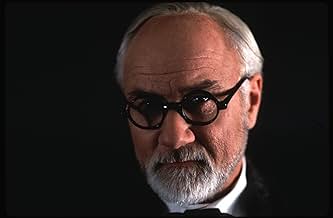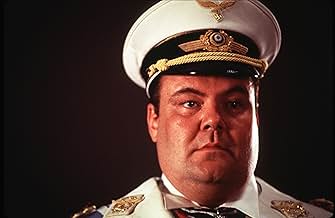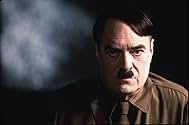Aggiungi una trama nella tua linguaAdolf Hitler faces himself and must come to terms with his infamous career in an imaginary post-war subterranean bunker where he reviews historical films, dictates his memoirs and encounters... Leggi tuttoAdolf Hitler faces himself and must come to terms with his infamous career in an imaginary post-war subterranean bunker where he reviews historical films, dictates his memoirs and encounters Eva Braun, Josef Göbbels, Hermann Göring, and Sigmund Freud.Adolf Hitler faces himself and must come to terms with his infamous career in an imaginary post-war subterranean bunker where he reviews historical films, dictates his memoirs and encounters Eva Braun, Josef Göbbels, Hermann Göring, and Sigmund Freud.
- Regia
- Sceneggiatura
- Star
- Premi
- 7 vittorie e 1 candidatura in totale
- Hitler Youth
- (as Christopher Levitus)
Recensioni in evidenza
The story illuminates the power of illusions and how someone could delude themselves into believing almost anything. It humanizes Hitler a bit, examining how he destroyed himself in his lust for power, and how the same thing could happen again.
"The Empty Mirror" parallels the Third Reich in that it shows Hitler, dictating his memoirs in Hell, gradually disintegrating both emotionally and physically as he confronts the enormity of his horrific actions.
Yes, this movie would be considered politically incorrect by some for not portraying Hitler as a two-dimensional monster, all fire and brimstone, but showing that he had actual human emotions, had fallen in love with a facade of his own (and Dr. Goebbels) creation, and learning that once the facade was demolished, what lived behind it was a puny, cowardly man.
Acting was terrific on all counts. Rodway, although physically far more imposing than the Fuhrer, did an excellent job as his character alternated between lucidity and madness. Joel Grey was a splendid Dr. Josef Goebbels, a sarcastic smart-ass who was perhaps the world's first spin doctor. The Eva Braun character was both sweet and pathetic as Hitler's airheaded mistress, then wife, who wanted nothing more than attention from him. But most frightening were the little blond Deutsche Kinder who were mesmerized by Onkel Adolf, in the same way that 70 million Germans were during the 12 years of the Thousand Year Reich.
In one of the more revealing moments of the film, Hitler belittles Stalin, saying the latter will be simply a blip on the radar screen of life (I'm paraphrasing). He, of course, was right. Stalin may have killed more, and the KGB certainly matched the Gestapo in cruelty, but Russia was and is a nation where human life is cheap. Germany was not and is not, except for those 12 years.
While this isn't easy viewing, and requires some knowledge of history, it should be required viewing in high school Modern European History courses, along with "Schindler's List" and "Judgment at Nuremberg." If we understand Hitler, and how he was able to mesmerize 70 million otherwise highly intelligent people, then history will be far less likely to repeat itself.
A complex and intriguing experimental film, Barry J. Hershey's 'The Empty Mirror' is a fascinating examination of one of the most infamous characters in history. Written alongside someone credited only as R. Buckingham, Hershey's screenplay is strongly written, painting a nuanced portrait of the Führer, whilst condemning his National Socialist policies. Much like Oliver Hirschbiegel's 'Downfall,' the film does not take a one-dimensional view of the man, exploring the humanity of a most inhumane character.
Hershey's version of Hitler is a man struggling to accept the fact that his policies failed, that his ideas for the world were not realized in his lifetime. Though an egotistical lunatic in many respects, the film highlights the magnetic- and to modern viewers, perhaps maniacal- draw he had over audiences. Through his rants- many of which are taken word for word from 'Mein Kampf'- we begin to understand the man better than in most other contemporary accounts or films; such as the overwrought 'Hitler: The Rise of Evil,' or in the rather one-note 'The Death of Adolf Hitler.'
It is a powerful film with an important- albeit familiar- message at its centre: that absolute power corrupts absolutely, and that even the most powerful and evil people are still just that; people. The film doesn't try to mythologize the man, nor his actions, and is all the better for it. Furthermore, through his encounters with Freud, Hitler is finally faced with someone who disagrees with him on practically every level. In this respect, the narrative showcases that authoritarianism breeds isolated ignorance, leading everyone involved down a dark and sinister path.
'The Empty Mirror' is a visually striking affair, containing stylish imagery that compounds the main messages of the film. Influenced by the same expressionism and surrealism so well-utilized by Leni Riefenstahl, Frederick Elmes's unique cinematography employs a compelling mix of black-and-white and colour footage. This choice deftly contrasts the stark reality of Hitler's ideology with the vivid, often grotesque fantasy of his envisioned utopia.
Symbolic elements are woven throughout, with the mirror serving as a recurring motif for self-reflection, while the painting and chessboard symbolizes control and strategy. The mysterious woman in black introduces an element of the unknown, casting a shadow over Hitler's certainty, while Elmes's use of tight close-ups captures the intensity of his delusions. Elmes's utilisation of low angle shots elevates the Führer's imposing presence, while the dimly lit, oppressive bunker interior makes for a claustrophobic experience, trapping the viewer in Hitler's warped mindset; forcing a confrontation with the disturbing allure of his rhetoric. Elmes's work not only enhances the psychological drama of proceedings, but also serves as a stark reminder of the power of visual media to manipulate and mesmerize.
Furthermore, John Frizzell's score is haunting and evocative. Combined with Elmes's visuals, his work recreates the intense atmosphere that must have been experienced at a National Socialist rally in the late 30's. Making effective use of pieces by Wagner and others, Frizzell's stirring melodies create an atmosphere of epic dread, which is only compounded by the affecting sound design, as well as Melinda Eshelman's remarkably accurate costume design; while Marc Grossman's intuitive editing holds everything together adroitly.
'The Empty Mirror' finds Norman Rodway starring as Hitler, delivering a powerful and poignant performance that highlights the man's madness, as well as his humanity. Rodway could be the fascist's double, at times, so uncannily does he capture Hitler's expressive gesticulations. It is a grounded performance, full of nuance and subtlety. Camilla Søeberg is equally good as the somewhat naïve Eva Braun, while Peter Michael Goetz, Glenn Shadix and Joel Grey do sterling efforts as Freud, Goering and Goebbels, respectively.
A fascinating film, 'The Empty Mirror' is a clever and canny examination of Adolf Hitler, that doesn't attempt to excuse the man or lessen the inhumanity of his actions. A balanced and provocative portrait of the madness borne of absolute power; it is a film that will keep one thinking long after the credits have rolled. Boasting strong dialogue, power-house performances, a stirring score and striking cinematography, Barry J. Hershey's 'The Empty Mirror' casts a reflection of life one cannot ignore.
Most people feel a need to discard Hitler as merely "insane" and "evil" because it conveniently avoids the stickiness of trying to develop an understanding of his psychology. Most other material about Hitler and the Third Reich may try to offer honest insights, but more often then not devolve at some point into oblique moral condemnation "All you REALLY need to know is that they were all very NAUGHTY/BAD/EVIL." They don't trust you to be intelligent and reach your own conclusions.
The Empty Mirror takes a reasonably unclouded look - the majority of Hitler's lines are taken directly from _Mein Kampf_ and his interaction with other significant figures of the era provide us with insight (conjectured but believable) into his thought processes, motives, and rationalizations.
The movie occurs in a surreal, dripping dark stone bunker which the camera never seems to quite capture the dimensions of. It's more of a "dream" state than actual location as the rooms change, occupants shift, uniforms taken on and off.
See the movie yourself. The director is for once not insulting our abilities and is providing an opportunity to reach our own conclusions. Swallow your distaste for the subject for an hour and a half and try to objectively form your own opinion.
Remember that this is the last movie hitler would ever want anyone to see - one that demystifies the "Fuhrer-myth" by showing him to NOT necessarily be a 2-dimensional cartoon hellbeast, but alas, merely a man.
Lo sapevi?
- BlooperWhen Hitler wears his uniform with the brown coat and white shirt he wears a black tie. The real Hitler, when wearing this uniform, would wear a brown tie with a tie pin of an eagle astride a swastika.
- Citazioni
[first lines]
Adolf Hitler: Before us lies Germany, within us marches Germany, and after us comes Germany!
- ConnessioniEdited into A. Hitler (2010)
I più visti
Dettagli
Botteghino
- Lordo Stati Uniti e Canada
- 4688 USD
- Fine settimana di apertura Stati Uniti e Canada
- 4688 USD
- 9 mag 1999
- Lordo in tutto il mondo
- 4688 USD
Contribuisci a questa pagina


